Bill Bradley and John McCain’s unusual joint appearance next week comes at a time when both candidates are surging in the New Hampshire polls by drawing new supporters from the same pool – Independents. The increasing importance of this key group of voters raises several questions, among them: Will both candidates remain attractive to volatile Independents, or is this a passing fancy with one or both men? Will these insurgent candidates siphon off each other’s potential backers, as Independents can vote in either primary? And finally, how good a job will the polls do in figuring out how and where the independent vote will go?
Most of the gains made by Bill Bradley and John McCain in the latest Granite State polls have occurred among Independents. According to a Newsweek poll taken in early December, Bradley picked up 24 percentage points in less than a month among Independents who said they are likely to vote in the Democratic primary. Over the same period, McCain gained 16 percentage points among Independents likely to vote in the GOP primary, according to Newsweek.
Democratic frontrunner Al Gore gets relatively more backing from registered Democrats than from Independents in every recent New Hampshire poll. But even here, the vice president has cause for concern. Gore last had a clear majority among this most loyal Democratic segment of the likely electorate in a late October Gallup survey.
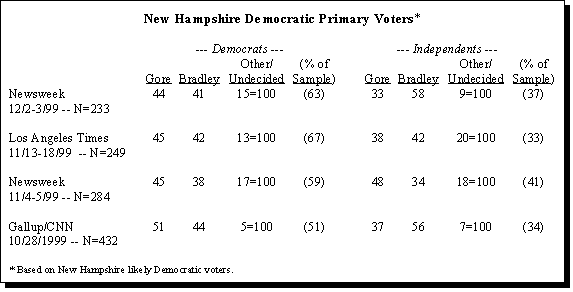
George W. Bush’s situation is not so bleak as Gore’s, but he too is losing the backing of Independents. Unlike the vice president, however, he continues to hold a significant lead over McCain among his party’s registered voters. Bush’s advantage has fluctuated over the past month, but a Boston Herald survey, taken Dec. 3-4, shows the Texas governor with a 9% lead over McCain among likely GOP voters.
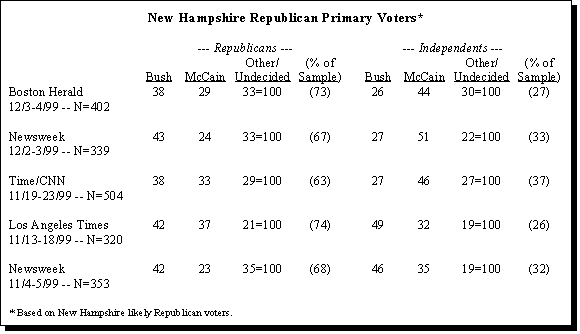
While the campaigns of both Bradley and McCain are benefitting from a surge of independent support now, things will get more complicated in the next seven weeks. New Hampshire Independents do not have to decide until Election Day whether they will vote in the Republican or Democratic primary. A big boost for McCain among Independents could be bad news for Bradley and, in an odd twist, good news for Gore. Bush might benefit if Bradley begins making significant inroads in the independent vote at McCain’s expense.
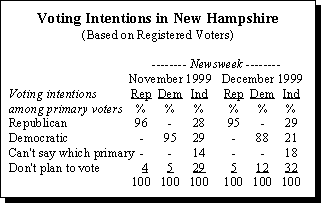
The most recent Newsweek poll found some indications this could be a zero-sum game for Bradley and McCain. As support for the Arizona senator grew in between November and December, the percentage of Independents intending to vote in the Democratic primary fell from 29%-to-21%. But it is too early to read much into that modest shift. Measuring turnout is among the most difficult things pollsters have to do in any election, and that task is even harder in a notoriously fickle primary state.
The Civilian-Military Gap Flap
Signs of a widening political divide between an increasingly conservative military elite and the public at large have triggered worrisome newspaper headlines and set off warning bells in the Pentagon. But a review of recent polls and surveys on this explosive subject suggests there is little to justify the alarmism being expressed in many quarters.
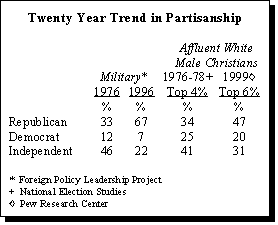
Proponents of the civilian-military gap point to disturbing trends. Over the past two decades, senior military officers have “largely abandoned political neutrality” and now are probably “the most solidly Republican professional group in American society,” concluded a pair of North Carolina researchers.(1) While the public is fairly evenly split along partisan lines, 64% of elite military officers identified themselves as Republicans, against only 8% who called themselves Democrats, according to a survey by the Triangle Institute for Security Studies, a North Carolina-based research organization.
But amid all of the media attention focused on this formidable political divide, two important points have been overlooked. First, part of the long-term rise of Republicanism in the military’s ranks can be attributed to broader political and demographic changes. Second, the higher echelon of the armed forces is by no means the most Republican-oriented professional group in society. Indeed, these senior officers are no more Republican than corporate executives and members of other leadership groups.
Between 1976 and 1996, the percentage of officers identifying themselves as Republicans more than doubled, from 33% to 67%. Over roughly the same period, the Republican Party has attracted a growing share of high-income, white Christian males, which is the demographic group that dominates the senior ranks of the military. Between 1976 and 1978, 34% of white Christian males in the top 4% of household income considered themselves Republicans, against 25% who called themselves Democrats. In 1999, 47% of white Christian males in the top 6% of household income identified with the GOP, while only 20% identified themselves as Democrats. This trend may account for much–though clearly not all–of the Republican shift by the military elite.
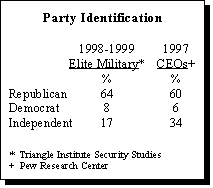
The political profile of the military elite that emerges from the Triangle survey bears noticeable similarity to that of corporate executives. A 1997 poll by the Pew Research Center found that chief executive officers identified themselves as Republicans by a 10-to-1 margin over those who considered themselves Democrats. In a 1999 Pew survey, Republicans held a decided edge in the partisan preferences of mid-to senior-level officials in several business sectors. More than three-fifths of corporate tax officers (64%) identified themselves as Republican or leaned Republican. By a 3-to-1 margin (66%-22%), aviation executives considered themselves Republican or leaned Republican, against those who described themselves as Democrats. But there have been no newspaper headlines warning of a dangerous partisan gap between CEOs or other business officials and the rest of society.
Where’s the Contempt?
The partisan gap in the Triangle survey appears larger than it is in part because that study highlighted differences between the officers’ attitudes and those of a supposedly comparable group of civilian leaders. The civilian sample — drawn from “Who’s Who in America” and similar lists — was more heavily female than the military group (41%-9%). The Who’s Who list from which the sample was largely drawn also includes high numbers of scholars and academics, professions where there traditionally has been strong support for Democrats. Of those civilian leaders without military experience, 43% identified themselves as Democrats, while 30% called themselves Republicans.
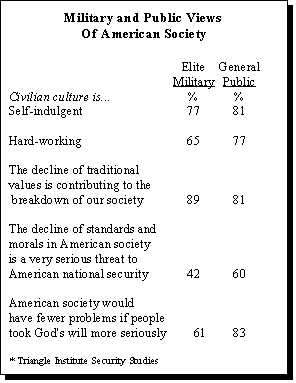
One troublesome aspect of the gap phenomenon is the subtle association made between the military officers’ strong affinity for the GOP and their supposed sense of alienation from American society. According to a thesis made popular by Wall Street Journal reporter Thomas E. Ricks, who has written extensively on the subject, military personnel have come to view America’s culture with contempt and, as a result, have not just become overwhelmingly Republican, but also far more conservative. “They are increasingly comfortable with the Rush Limbaugh variant of Republican conservatism,” is the way one researcher involved in the project characterized Ricks’ thesis.
In fact, two-thirds of the officers surveyed in the Triangle poll described themselves as somewhat or very conservative. But these labels don’t mean much, given the officers’ relatively moderate positions on subjects ranging from abortion to gun control. Surprisingly, the military elite is somewhat more liberal than the public on some of these issues.
It is also true that military officers are quite critical of the decline of standards and morality in society. But then again, so is the public. Evidently, one doesn’t need to wear a uniform to react negatively to the trends in popular culture. While strong majorities of both groups believe that the decline of traditional values is contributing to a breakdown in society, the public was more likely (60%-42%) than the military elite to view moral decline as a national security threat. The public also was more inclined (83%-61%) to express the view that society would have fewer problems if people took God’s will more seriously. But there was a significant divergence over the question of whether society would be better off if it adopted the military’s values. No surprises here: The officers favored this idea far more than the public (77%-38%).
On several contentious domestic issues, the officers do not appear to have much in common with Rush Limbaugh, or GOP presidential frontrunner George W. Bush Jr. for that matter. More than two-thirds of the officers in the Triangle poll (69%) expressed some support for placing stringent controls on the sale of handguns. In an August 1999 Pew survey, only 56% of the public favored restrictions on handgun sales. A strong majority of the officers (65%) supported leaving abortion decisions to women and their doctors. Public attitudes on abortion vary, depending on the issues involved, but an ABC News/Washington Post poll in September found that about three-fifths of the public (57%) favor keeping abortion legal in most circumstances.
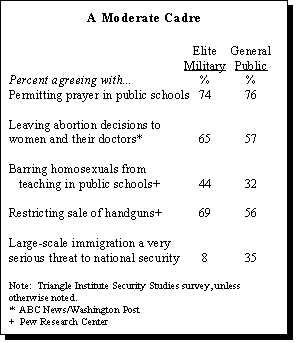
In their attitudes toward censorship and immigration, the military officers were far more permissive than the public at large. More than half of the public in the Pew survey (52%) said that books containing dangerous ideas should be banned from public school libraries. In the Triangle survey, however, the officers were overwhelmingly opposed (by margins of at least 8-to-1) to banning books in public libraries that advocated homosexuality and communism, or contained anti-religious themes. While 35% of the public regards large-scale immigration as a very serious threat to the nation’s security, only about 8% of the elite military shares that view.
Strong Backing for Civilian Control
When it comes to many of the critical questions related to continued civilian control over the military, the officers’ dominant attitude is one of caution. There is a gap in the responses to these questions, but not the one we have been warned about: Nine out of ten officers (91%) believe civilian officials should have the final say over whether or not to use military force, a position supported by just 52% of the public.
The military elite is more conservative than the public on sensitive questions related to the role of homosexuals in society. That might not be surprising given the storm of controversy that erupted in the military over President Clinton’s unsuccessful attempt to roll back restrictions on openly gay service personnel in 1993. Nearly half of the military elite (44%) favored barring homosexuals from teaching in public schools. In a similar question on a Pew survey in September, 32% of the public said that school boards should have the right to fire teachers who are known homosexuals. Strong majorities of both the officers (74%) and the public (76%) agree that prayer should be permitted in public schools.
In seeking to diagnose causes for the partisan gulf between the military and civilian cultures, many researchers and journalists have portrayed senior officers as conservatives who have distanced themselves from a society they increasingly regard as immoral and corrupt. Meanwhile, other possible explanations have gone largely unexplored. For more than a generation, the Republican party has been more supportive of the military and defense spending than Democrats. This year, Republican leaders in Congress cited enactment of legislation raising military pay as one of the session’s major accomplishments. Is it possible that this political message is resonating with military officers and that they, like business executives or other traditional Republican constituencies, are identifying with the GOP simply out of self-interest?
Endnotes
1. Peter D. Feaver, Associate Professor of Political Science at Duke University, and Richard H. Kohn, Professor of History at the University of North Carolina, Chapel Hill, in their digest of findings on the Project on the Gap Between the Military and Civilian Society.